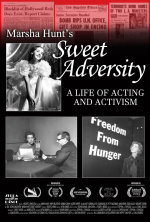Marsha Hunt's Sweet Adversity
Marsha Hunt's Sweet Adversity
Marsha Hunt was discovered while on a trip to Hollywood in May 1935. She was 17 years old when she was signed by Paramount Pictures. In the depth of the Depression, she made $250 a week. She went on to a flourishing career at MGM in the 1940's before her career was cut short by a series of unfortunate events that led to her becoming unfairly blacklisted. Through interviews with Marsha and those who knew her well, Marsha Hunt's Sweet Adversity explores her life and career achievements as an actress and activist.
The film breaks Marsha’s life story down into three parts – her life before being blacklisted, the period leading up to the blacklist and her life after the blacklist. It shows how the blacklist served as a “springboard” to her second career as a full time activist and humanitarian (though she’s still very much an actor.)
Marsha’s life before the blacklist was a time of great joy and innocence. The period leading up to her being blacklisted provides the drama and tension in the film. Her story is a history lesson that can only be told by someone who was there as Marsha was. She is the only member of the Committee for the First Amendment alive today that can talk about the trip she and others took in October 1947 to support the “Hollywood 19.”
In 1950, her thriving career in radio, television and films came to a screeching halt when her name appeared in the right wing publication “Red Channels.” After witnessing abject poverty while on a trip around the world in 1955, Marsha knew she had to educate her fellow Americans about the dire state of the world. She used her celebrity to help raise awareness and funds for the work that the United Nations was doing on behalf of the planet.
Over the course of the next 60 years, Marsha devoted her life to humanitarian causes such as ending world hunger and homelessness. Over the years, she worked with fellow activists Eleanor Roosevelt and George McGovern (who is interviewed in the film) and celebrities such as John Denver and Valerie Harper (also interviewed) on the issue of fighting world hunger.
Her most powerful and meaningful activism work took place when she was asked to be the “Honorary Mayor” of her hometown, Sherman Oaks. Her crowning achievement as Mayor was opening the first homeless shelter in the San Fernando Valley thirty-two years ago.
Her life story has peaks and valleys that span the course of the 20th century. The underlying theme of the documentary is that Marsha rose above adversity. When life handed her lemons, she made lemonade. When the industry she loved turned its back on her, she forgave them and moved on a second career as a “planet patriot.”
She continues to support causes that she feels need a voice. This film is Marsha’s final act of activism. Through her words and action, this film will serve as an inspirational primer for activists of all ages.
The film breaks Marsha’s life story down into three parts – her life before being blacklisted, the period leading up to the blacklist and her life after the blacklist. It shows how the blacklist served as a “springboard” to her second career as a full time activist and humanitarian (though she’s still very much an actor.)
Marsha’s life before the blacklist was a time of great joy and innocence. The period leading up to her being blacklisted provides the drama and tension in the film. Her story is a history lesson that can only be told by someone who was there as Marsha was. She is the only member of the Committee for the First Amendment alive today that can talk about the trip she and others took in October 1947 to support the “Hollywood 19.”
In 1950, her thriving career in radio, television and films came to a screeching halt when her name appeared in the right wing publication “Red Channels.” After witnessing abject poverty while on a trip around the world in 1955, Marsha knew she had to educate her fellow Americans about the dire state of the world. She used her celebrity to help raise awareness and funds for the work that the United Nations was doing on behalf of the planet.
Over the course of the next 60 years, Marsha devoted her life to humanitarian causes such as ending world hunger and homelessness. Over the years, she worked with fellow activists Eleanor Roosevelt and George McGovern (who is interviewed in the film) and celebrities such as John Denver and Valerie Harper (also interviewed) on the issue of fighting world hunger.
Her most powerful and meaningful activism work took place when she was asked to be the “Honorary Mayor” of her hometown, Sherman Oaks. Her crowning achievement as Mayor was opening the first homeless shelter in the San Fernando Valley thirty-two years ago.
Her life story has peaks and valleys that span the course of the 20th century. The underlying theme of the documentary is that Marsha rose above adversity. When life handed her lemons, she made lemonade. When the industry she loved turned its back on her, she forgave them and moved on a second career as a “planet patriot.”
She continues to support causes that she feels need a voice. This film is Marsha’s final act of activism. Through her words and action, this film will serve as an inspirational primer for activists of all ages.
Genre
Documentary,
Bio-pic
Runtime
97
Language
English
Director
Roger C. Memos
Played at
Town Center 5 7.13.18 - 7.19.18
Fine Arts Theatre 7.31.18 - 7.31.18
Marsha Hunt's Sweet Adversity Get Tickets
There are currently no showtimes for this film. Please check back soon.

